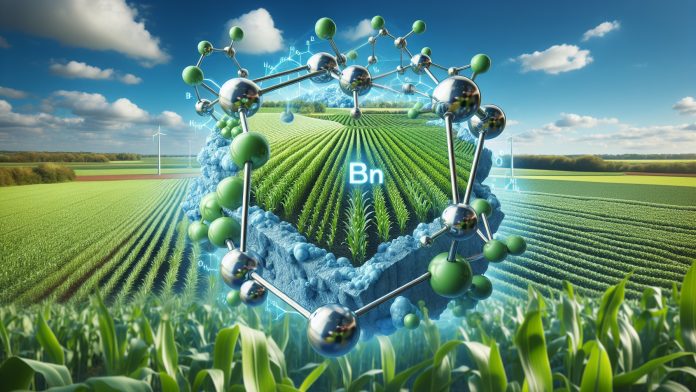Boron, often overlooked but essential for food production, plays a crucial role in ensuring the health and productivity of crops.
Without an adequate supply of boron, plants struggle to thrive and produce optimally. Its impact on soil fertility and plant growth is profound, influencing the quality and quantity of our food supply.
Understanding the significance of boron in food production is key to unlocking its potential benefits for sustainable food production and global food security.
The intricate relationship between boron and crop development holds the key to a more resilient and fruitful agricultural future.
Boron as a vital micronutrient
Boron serves as a crucial micronutrient for plant growth and development, playing a vital role in enhancing crop health and productivity.
It’s essential for various aspects of plant life, including cell development, reproductive health, and overall crop vitality.
When plants receive adequate boron, it aids in the formation of cell walls, ensuring structural integrity and support for the plant.
This micronutrient also plays a key role in reproductive processes, such as pollen germination and seed production, which are critical for the successful propagation of plant species.
Moreover, boron contributes to crop vitality by supporting functions like sugar transport within the plant and the metabolism of carbohydrates, proteins, and nucleic acids.
Without sufficient boron, plants can exhibit stunted growth, abnormal cell development, and decreased yields, highlighting the importance of this micronutrient in ensuring optimal plant health and productivity.
Improving soil fertility with boron
Enhancing soil fertility can be achieved effectively through strategic utilisation of boron, demonstrating significant potential for improving crop yields and resilience against environmental stressors.
Soil enrichment is a critical aspect of agricultural productivity, and boron plays a key role in this process.
By incorporating boron into soil management practices, you can enhance nutrient availability for plants, leading to healthier crops and increased yields.
Moreover, boron contributes to crop resilience by strengthening cell walls, improving water and nutrient uptake efficiency, and enhancing overall plant vigour.
This resilience is crucial in mitigating the impact of environmental stressors such as drought, salinity, and extreme temperatures, ensuring a more stable and productive agricultural system.
Addressing global food security challenges
To address global food security challenges effectively, considering the pivotal role of boron in enhancing crop resilience and productivity becomes imperative.
Boron deficiency in soils can significantly impact agricultural sustainability and food security worldwide. Regions with boron-deficient soils face decreased crop yields and poor crop quality, leading to food shortages and economic instability.
By incorporating boron into agricultural practices, farmers can mitigate these challenges by improving plant health, increasing yields, and enhancing the nutritional value of crops.
The presence of sufficient boron levels in soils is essential for supporting plant growth, root development, and nutrient uptake, ultimately contributing to a more secure food supply.
Addressing boron deficiency through targeted interventions can help build resilience in agricultural systems, ensuring sustainable food production to meet the needs of a growing global population.
Boron in sustainable agriculture
Sustainable agriculture practices benefit from incorporating boron to optimise crop growth and minimise environmental impact.
Boron plays a crucial role in maintaining soil health by aiding in nutrient uptake and root development, ultimately leading to improved crop sustainability.
By ensuring adequate boron levels in the soil, farmers can enhance the overall health and resilience of their crops, making them more resistant to environmental stressors.
Furthermore, the use of boron in sustainable agriculture offers significant environmental benefits.
By reducing the need for chemical fertilisers through boron supplementation, farmers can promote more eco-friendly farming practices and contribute to environmental conservation efforts.
This not only helps in preserving the natural ecosystem but also minimises the potential negative impacts of excessive fertiliser use on soil and water quality.
Incorporating boron into sustainable agricultural practices is a strategic approach to not only improve crop productivity but also to safeguard the environment for future generations.
Economic impacts on global agriculture
Market analysis indicates that the demand for boron in agriculture is steadily increasing due to its proven benefits in boosting crop yields and enhancing overall plant productivity.
Farmers who strategically incorporate boron into their soil fertility management practices often experience improved profit margins through higher-quality harvests and increased market value for their produce.
Moreover, investing in boron supplementation presents promising opportunities for agricultural stakeholders looking to optimise their operations and maximise returns.
By conducting a thorough market analysis and recognising the potential for growth in the boron sector, farmers can make informed decisions that lead to sustainable financial gains.
The economic impact of boron goes beyond just enhancing crop yields – it offers a pathway to reducing costs associated with traditional fertilisers and pesticides, ultimately contributing to the long-term profitability of farming ventures.
Overall, it’s clear that boron plays a crucial role in sustainable food production. By enhancing crop growth, improving plant health, and increasing yields, boron contributes significantly to the overall health and productivity of crops.
Its presence in soil fertility programmes improves water and nutrient uptake efficiency, ultimately bolstering plant vigour and resilience.
With its importance in sustainable agriculture practices and addressing global food security challenges, boron is truly essential for ensuring a stable food supply for populations worldwide.









